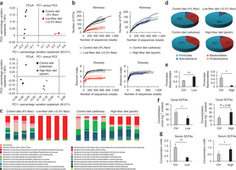Alterations in the gut microbiota affect stroke outcomes via modulation of T cells, suggesting a gut-brain axis linking commensal microbes with the CNS.
Research and publish the best content.
Get Started for FREE
Sign up with Facebook Sign up with X
I don't have a Facebook or a X account
Already have an account: Login
Latest advances in immunopathology diagnosis and treatment
Curated by
Alfredo Corell
 Your new post is loading... Your new post is loading...
 Your new post is loading... Your new post is loading...
|
|




![Commensal microbiota affects ischemic stroke outcome by regulating intestinal [gamma][delta] T cells : Nature Medicine : Nature Publishing Group | Immunopathology & Immunotherapy | Scoop.it](https://img.scoop.it/TRrxkpys-j5OIm8p8x6Ztjl72eJkfbmt4t8yenImKBVvK0kTmF0xjctABnaLJIm9)









Commensal gut bacteria impact the host immune system and can influence disease processes in several organs, including the brain. However, it remains unclear whether the microbiota has an impact on the outcome of acute brain injury. Here we show that antibiotic-induced alterations in the intestinal flora reduce ischemic brain injury in mice, an effect transmissible by fecal transplants. Intestinal dysbiosis alters immune homeostasis in the small intestine, leading to an increase in regulatory T cells and a reduction in interleukin (IL)-17–positive γδ T cells through altered dendritic cell activity. Dysbiosis suppresses trafficking of effector T cells from the gut to the leptomeninges after stroke. Additionally, IL-10 and IL-17 are required for the neuroprotection afforded by intestinal dysbiosis. The findings reveal a previously unrecognized gut-brain axis and an impact of the intestinal flora and meningeal IL-17+ γδ T cells on ischemic injury.